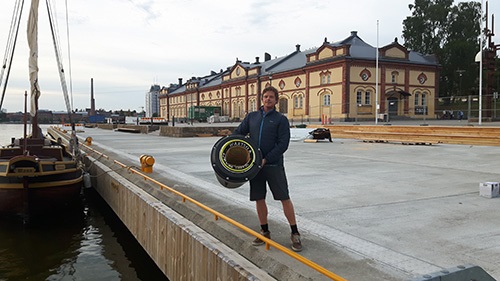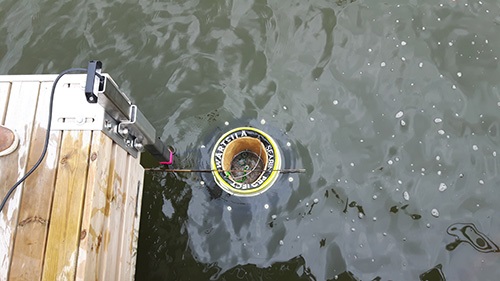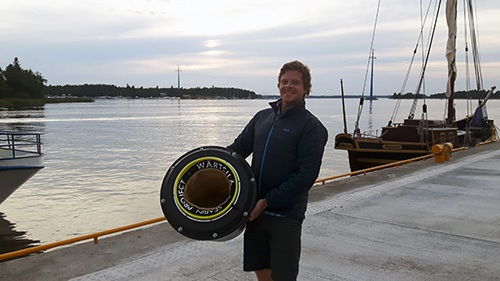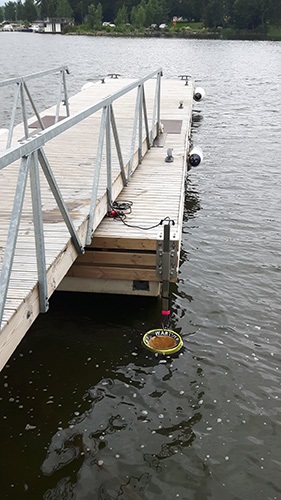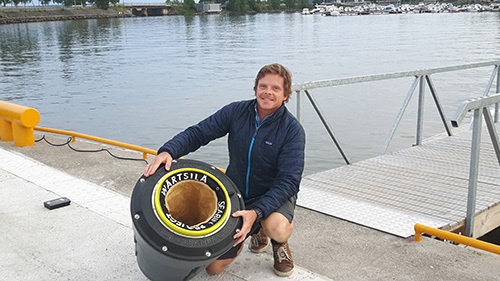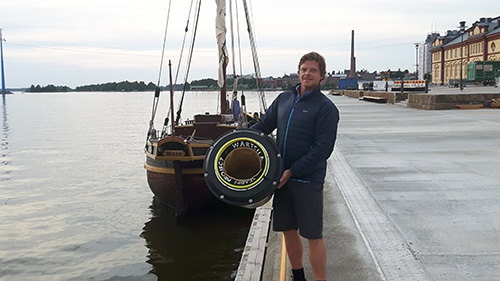
Seabin floating rubbish bin presented at the Night of Arts in Vaasa
The technology group Wärtsilä's project to bring floating rubbish bins to Finland is making progress. The project is being executed in honour of Finland's centenary. Today as a part of the Night of Arts event in Vaasa and in in co-operation with the city of Vaasa, Seabin was installed for test use in the Inner harbour nearby Kuntsi´s museum of modern art.
”Taking care of the environment has a central place in Wärtsilä´s strategy and we are investing in developing technologies that will secure the future of marine environment. In Vaasa the sea is close to everybody and it is a pleasure to be able to test the Seabin floating rubbish bin here too. At the same time we want to emphasize that we can all affect the cleanliness of the sea environment with our own actions,” says Juha Kytölä, Vice President, Environmental Solutions at Wärtsilä Marine Solutions.
Peter Ceglinski from the Seabin Project says: "Seabin Project is proud to announce Vaasa as the third city in the strategic rollout of Seabin technology throughout Finland for Wärtsilä's Finland 100 contribution this year. These important and strategic installations are part of a global initiative to solve the ocean plastics problem. Working with an industry leader like Wärtsilä enables this dream of cleaner oceans to be one step closer to becoming a reality."
During the partnership programme, Wärtsilä has already donated two floating rubbish bins to the City of Helsinki and one to Turku.
”We are very happy and pleased that as the third city in Finland we get the Seabin floating rubbish bins to Vaasa. It is fascinating to observe them in action. Every piece of trash that ends up in Seabin is a step forward, especially while the craggy shores of Vaasa are difficult to clean up from trash,” comments Teijo Seppelin from the city of Vaasa.
Wärtsilä has collaborated with the Keep the Archipelago Tidy Association by supporting its operations and coastal cleanliness since 2009. In 2017, the collaboration and support will be weighted towards the beach clean-up work promoted by the Clean Beach campaign. Project Manager Anna Zweygbergk: ”Ocean littering is being discussed more and more all over the world and innovations like Seabin are more than welcome. Since 2011 Keep the Archipelago Tidy Association has watched the condition of Finnish shores through monitoring cleanings and the Clean Beach campaign, which is also supported by Wärtsilä. In addition to our concrete waste management work, we have been able to gather information, influence people’s attitudes and provide a concrete way to participate. The results have shown, that the problem with trash is real also on our Finnish coastline and in the Baltic Sea.”
What is the Seabin?
The Seabin Project provides solutions to the problem of littering in seas around the world. The project is approaching the challenge from several angles, with special focuses on education, research and technology.
The Seabin is a floating rubbish bin that is located in the water at marinas, docks, yacht clubs and commercial ports, where it collects all floating rubbish. Water is sucked in from the surface and passes through the catch bag inside the Seabin. The water is then pumped back into the marina leaving litter and debris trapped in the catch bag to be disposed of properly. The Seabin also has the potential to collect some of the oils and pollutants floating on the water surface. The Seabin Project's team currently uses 12-volt submersible water pumps that can utilise alternative and clean energy sources. These may include solar, wave or wind power, depending on the location and available technology.
Wärtsilä will be operating as the Seabin Project's global pilot partner for the next three years. The other six pilot partners are La Grande Motte in Southern France, Porto Montenegro in Montenegro, Port Adriano in Mallorca (Spain), Butterfield in Bermuda, and Safe Harbor Marinas in the United States. Seabin Project launched its new V5 Hybrid model at the end of April. It then began installing prototypes at its pilot partners' sites. For a three-month trial period, the pilot partners will provide information about how the floating rubbish bins have functioned. Seabins are expected to go on commercial sale during the autumn.
Wärtsilä's sustainable environmental initiatives
Wärtsilä is a member of the Sustainable Shipping Initiative and is a signatory to the UN's Global Compact initiative. The company is transforming traditional shipping and energy markets by developing sustainable and renewable solutions that improve the environmental footprint of maritime transport and energy generation.
Wärtsilä offers high technology designed to reduce ship emissions: systems for scrubbing exhaust gases and dual fuel engines, which are primarily designed for liquefied natural gas – a cleaner alternative to diesel and biodiesel. Wärtsilä also designs, delivers and installs technologies designed for processing ballast water, reducing the amount of pollution released into oceans. This is beneficial to marine ecosystems all around the world. Wärtsilä's remote monitoring and equipment monitoring help to optimise ship operations.
Wärtsilä's strong offering has received significant reinforcement in the form of solar energy solutions. Wärtsilä's sustainable innovations help its customers to reduce their carbon emissions. Wärtsilä is the first company to offer large-scale solar hybrid power plants. Hybrid solutions combine solar power farms with Wärtsilä's smart and highly flexible power plant solution. Both units operate in a synchronised manner, cutting the amount of fuel consumed by the engines.
Background to ocean littering
Plastic has an astonishingly large impact on the environment and ecosystems. It is estimated that by 2025, the oceans will contain one ton of plastic for every three tons of fish. It is also estimated that by 2050, the oceans will contain more plastic by weight than fish (source: Ellen Macarthur Foundation, 2016). In the past ten years, more plastic has been produced in the world than in the entire 20th century. Plastic causes more than USD 13 billion of damage to marine ecosystems every year. Animals swallow our waste and become entangled in it. Local marine environments suffer, which decreases fish and shellfish stocks. Shipping and tourism may suffer, as people are exposed to harmful impurities when they inadvertently eat polluted seafood.
Read more on Wärtsilä's Finland 100 pages
Link to photos
Further information:
Communications Manager Sari Luhanka | Communications Director Marica Lassus |
